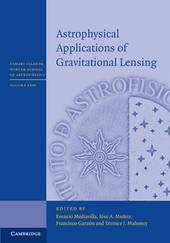
|
Astrophysical Applications of Gravitational Lensing
Hardback
Main Details
| Title |
Astrophysical Applications of Gravitational Lensing
|
| Authors and Contributors |
Edited by Evencio Mediavilla
|
|
Edited by Jose A. Munoz
|
|
Edited by Francisco Garzon
|
|
Edited by Terence J. Mahoney
|
| Series | Canary Islands Winter School of Astrophysics |
|---|
| Physical Properties |
| Format:Hardback | | Pages:302 | | Dimensions(mm): Height 252,Width 178 |
|
| Category/Genre | Astronomy, space and time |
|---|
| ISBN/Barcode |
9781107078543
|
| Classifications | Dewey:523.112 |
|---|
| Audience | | Tertiary Education (US: College) | |
|---|
| Illustrations |
12 Tables, black and white; 111 Halftones, black and white; 25 Line drawings, black and white
|
|
Publishing Details |
| Publisher |
Cambridge University Press
|
| Imprint |
Cambridge University Press
|
| Publication Date |
6 October 2016 |
| Publication Country |
United Kingdom
|
Description
Gravitational lenses offer the best, and sometimes the only, means of tackling key problems in many fields of astrophysics and cosmology. According to Einstein's theory, the curvature of light-rays increases with mass; gravitational lenses can be used to map the distribution of mass in a Universe in which virtually all matter is dark matter of an unknown nature. Gravitational lensing has significantly improved our knowledge of many astrophysical phenomena, such as exoplanets, galaxies, active galactic nuclei, quasars, clusters, large-scale structure and the Universe itself. All these topics are covered fully in this book, together with two tutorials on lens and microlensing modelling. The future of lensing in relation to large surveys and the anticipated discoveries of thousands more gravitational lenses is also discussed, making this volume an ideal guide for postgraduate students and practising researchers in the use of gravitational lenses as a tool in their investigations.
Reviews'Each article is self-contained and as a whole it presents an overview of the field of strong lensing ... For the reader who is entering the filed this is a useful collection that summarizes it well.' Alan Heavens, The Observatory
|